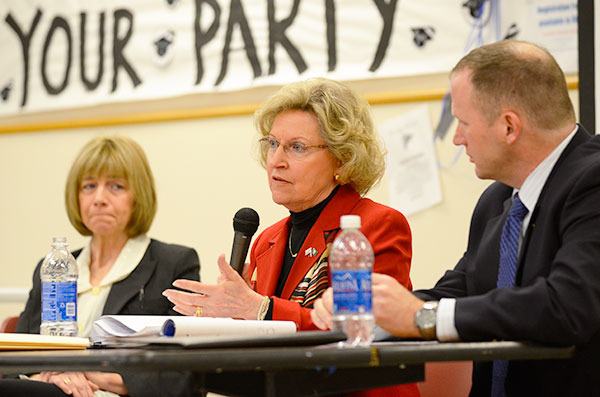Tenth District lawmakers last week briefed constituents on highlights of the 2014 Legislative session.
Convening at South Whidbey High School before a crowd of about 30 were state Rep. Norma Smith, R-Clinton; Sen. Barbara Bailey, R-Oak Harbor; and Rep. Dave Hayes, R-Camano.
The three each took about 10 minutes to bring the crowd up to speed about what they felt were highlights in Olympia, from Bailey’s promotion of a budget that made gains in higher education to Haye’s unsuccessful bill to end an exemption for lawmakers that prevents them from getting speeding infractions during the session.
“My intent in bringing that bill was that we are not above the law,” Hayes said.
The bill never made it out of committee.
Smith talked about her focus on economic development through the fostering of sustainable energy industries. She echoed Bailey’s sentiments that a balanced budget was adopted with a great bipartisan effort.
“The kind of support we saw literally hasn’t been seen in decades,” Smith said.
Smith complained that news organizations focus on what’s going wrong and that she was there to report good things are happening.
“I’m here to tell you things are going right,” Smith said.
Attendees took advantage of the question-and-answer portion of the meeting, quizzing the lawmakers on issues ranging from transportation to government accountability.
Freeland resident Bob Walters started things off by asking how far each was willing to go to address tax reform, and education and transportation funding issues.
Hayes said efforts are underway to lower transportation costs, which he claimed are more expensive in Washington. He also reiterated Bailey’s early report that “two-thirds of increased spending” went to higher eduction.
“We are addressing that issue; we’re getting there,” Hayes said.
Bailey and Smith both talked about a long-standing debate over Washington’s lack of a state income tax, and also the state’s business and operation tax, which is “crushing small businesses,” Smith said.
Mirroring recent local debates, public park funding was also a topic of discussion, with Langley resident Kim Drury asking what efforts were made to make the system more sustainable.
“I think our state park system is in a crisis,” she said.
Smith said that more than 50 percent of the state is publicly owned and that government must focus on maintaining what it has.
“To me, we need to slow this acquisition,” Smith said.
Clinton resident Doug Hofius said it seems that Mukilteo is receiving the focus of state financial dollars — Washington State Ferries investment in a new terminal — when Clinton is struggling just to survive.
“Our town is blight, it’s dying,” Hofius said.
“We’re kinda asking for your help to make things more reasonable on our side of the water because our people work at Boeing too,” he said.
Bailey said the Clinton ferry dock could be better and may be looked at during the next biennium to see what improvements might be made.
“It really begs the question about a few things that probably should have been in the design of that ferry dock,” Bailey said.
Hayes agreed, adding the state Department of Transportation, Ferries Division, “give more weight to ferry communities” when considering future projects.
“Right now there is no way … but your statement doesn’t fall on deaf ears,” he said.



